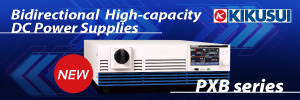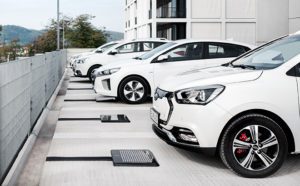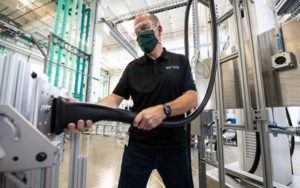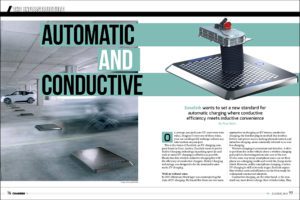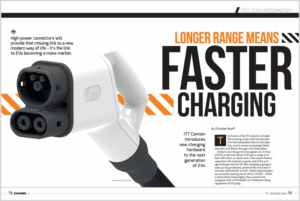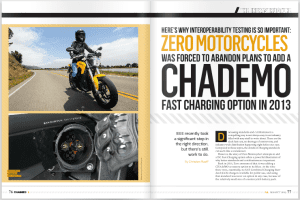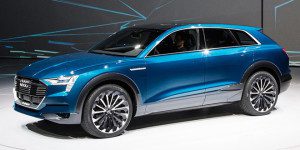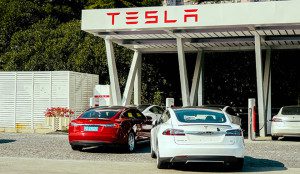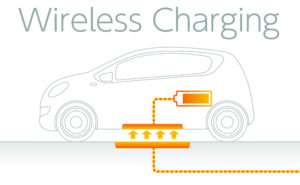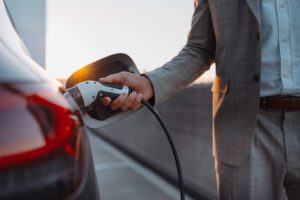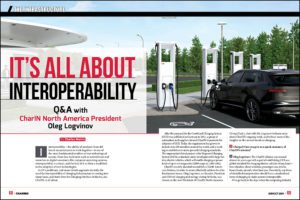China’s New Energy Vehicle Technology Innovation Center (NEVC) and Austrian charging hardware provider Easelink have signed a memorandum of understanding to deploy Easelink’s Matrix Charging system. The Matrix Charging system consists of two components: a connector installed in the vehicle underbody, and a pad installed in the parking space. As soon as the vehicle parks… Read more »
Search Results Found For: "Charging Interface Initiative"
Task force to develop Megawatt Charging System for heavy-duty EVs
In September, an international task force including representatives of the National Renewable Energy Laboratory (NREL) and the Charging Interface Initiative (CharIN) hosted a meeting of “leading OEMs, utilities, equipment manufacturers and suppliers” to test prototypes for a new charging system for heavy-duty vehicles: the Megawatt Charging System (MCS). The task force says the test, which… Read more »
Easelink wants to set a new standard for EV charging: Automatic and conductive
On average, you park your EV once every nine miles. Imagine if every one of those times, your car could quickly recharge without any intervention on your part. This is the vision of Easelink, an EV charging company based in Graz, Austria. Easelink wants to put its Matrix Charging technology in parking spots far and… Read more »
ITT Cannon introduces new fast charging hardware to the next generation of EVs
The future of the EV industry is bright. We’re losing count of all the planned EVs that automakers have in the pipeline. And it seems increasingly likely that they will follow through with those plans. If there’s one thing everyone agrees on, it’s that all EVs in the near future will have a range of… Read more »
Zero Motorcycles was forced to abandon DC fast charging option in 2013, Interoperability testing is needed
Editor’s note: After this article appeared in print, we received some feedback suggesting that the thesis is not clear enough. So, we’d like to point out a few things at the beginning. Today’s DC Fast Charging installations are very reliable. If you buy a production EV, such as a Nissan LEAF or BMW i3, it is unlikely that you will… Read more »
German carmakers to collaborate on development of DC fast charging up to 350 kW
If, as the media are firmly convinced, the German automakers’ EV strategies revolve around competing with Tesla, they will have to come up with an answer to the ascendant Supercharger network. The Europeans recently took a step in this direction with the formation of the Charging Interface Initiative (CharIN). Audi, BMW, Daimler, Opel, Porsche and… Read more »
Tesla to adapt to Chinese charging standards – as soon as they exist
Tesla has announced that it will fully support China’s charging standards, modifying its vehicles to ensure that they are compatible. This is surely a wise and necessary policy, as concerns about charging infrastructure are widely considered to be the main reason that EV sales in the world’s largest auto market have been slow to take… Read more »
CharIN launches new taskforce for wireless power transfer
The Charging Interface Initiative (CharIN) is a global alliance of EV and EVSE providers that promotes universal charging standards such as CCS, MCS and ISO 15118. Now CharIN has launched a Wireless Power Transfer Taskforce, initiated by Siemens, WiTricity, and MAHLE, in order to drive the adoption and standardization of wireless charging solutions for EVs…. Read more »
CharIN North America issues call for partners to establish EV charger testing sites
The Charging Interface Initiative (CharIN) is a global alliance of EV and EVSE providers, including 60 members headquartered in the US. It promotes universal charging standards such as CCS, MCS and ISO 15118. For the past seven years, the organization has hosted bi-annual testing events, including the recent Vehicle Interoperability Testing Symposium (VOLTS) in Long… Read more »
Q&A with CharIN North America President: It’s all about interoperability
Interoperability—the ability of products from different manufacturers to work together—is one of the most fundamental enablers of our technological society. From low-tech tools such as screwdrivers and wrenches to digital constructs like computer operating systems, interoperability is critical, and the lack of it is often a roadblock to the adoption of new technologies. As EVs… Read more »



